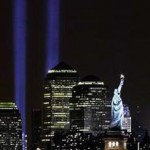The Myths of 9/11
 Nobody would claim that the United States and its allies have gotten everything right. But nine years after 9/11, we are winning the war against Al Qaeda.
Nobody would claim that the United States and its allies have gotten everything right. But nine years after 9/11, we are winning the war against Al Qaeda.
Some Americans are in a debunking mood on this ninth anniversary of the 9/11 terror attacks. Ted Koppel has produced a new documentary for the BBC arguing that America over-reacted to the murder of 3,000 citizens. Fareed Zakaria endorses the view in the current edition of Newsweek.
Let me join the party with some debunking of my own. Here are three ideas we heard a lot in the aftermath of 9/11. All of them have proven wrong. All continue to be heard even so.
1) We can't stop terrorism without addressing the Israeli-Palestinian dispute.
2) Invading Iraq will lead to a global surge of Islamic terrorism.
3) Terrorism is a product of poverty and despair.
Well, the Israeli-Palestinian dispute remains unresolved. Yet despite this non-resolution, the Islamic terrorism problem continues to dwindle.
Remember last Christmas's underwear bomber? His bomb failed to detonate because the bomber had bungled his mixing of the explosive components.
In 2001, al-Qaeda co-ordinated almost two dozen men into four simultaneous hijackings of four aircraft in two cities. Nine years later, al-Qaeda terrorists are operating solo and isolated, because they fear any co-operation will be infiltrated, any communication intercepted.
It's a valid fear. When would-be terrorists do attempt to co-operate, they end up like those four would be Canadianterrorists arrested this summer by the RCMP: arrested the minute their plot takes form.
In the years from the first bombing of the World Trade Center in 1993 through 9/11, terrorist attacks on the United States and its allies grew steadily more complex and sophisticated. In the decade since 2001, each attack has become less complex and less sophisticated. The 2002 Bali bombing was less sophisticated than 9/11, the bombing of the Madrid train station less sophisticated than Bali, the London Underground bombing less sophisticated than Madrid. After London, it's amateur hour: like the 2006 attempted bombing of the German train system that failed because the bombs didn't go off.
Yet the Palestinian-Israel dispute remains unresolved, and looks likely to continue unresolved for years to come.
Ditto Iraq. Remember how there was supposed to be a surge of rage against the governments who fought the Iraq war? Yet the worst violence occurred in France, which did not join the war. And even in France, Islamic extremist violence has abated since 2005, contained and defeated by effective police work.
Al-Qaeda radicals carried out co-ordinated deadly bombings inside Saudi Arabia in 2005. Not since. Saudi Arabia and other Gulf states now co-operate much more closely with the United States than ever before, including sharing financial information relating to terrorist networks. Terrorist incidents inside Iraq have tumbled by 90%, according to the Brookings Institution's Iraq Index, as more and more Iraqis have sided with the government and the coalition-backed security forces.
Back in 2001, many -- including then Canadian prime minister Jean Chretien -- opined that terrorism was caused by poverty. (Behind that expressed opinion was an unexpressed opinion: that global poverty was somehow the fault of the wealthy West. It's one more example of that old joke about the liberal-minded person who visits a friend in the hospital. The friend was savagely beaten in a mugging. The liberal visitor shakes his head sadly: "How much the poor man must have suffered for him to do such a thing!")
Yet as has been minutely documented since 2001, terrorists disproportionately come from the elite of their native societies. (The underwear bomber was the son of one of the richest men in Nigeria.) The societies that produce terrorists are likewise not poor, not the way Burma is poor or Congo is poor. Whatever it is, terrorism is not a cry of anguish from the dispossessed.
Ted Koppel asks: "Could bin Laden, in his wildest imaginings, have hoped to provoke greater chaos?"
Short answer: Yes, way more. He surely hoped not to be ending his days skulking in caves, his key lieutenants languishing in Guantanamo. He could have hoped to have seized power in Saudi Arabia, to be proceeding to a global caliphate with himself installed as caliph. Instead, the biggest mass movement in the Muslim world is the one that sent hundreds of thousands of protesters into the streets of Tehran to demand honest elections and an end to religious policing. The only place on Earth that is more oriented to bin Ladenism today than 10 years ago is the Gaza Strip. Big win.
Nobody would claim that the United States and its allies have gotten everything right these past nine years. Many mistakes have been made, much money wasted. But if we're going to take stock, let's take stock impartially, and remember how much was gotten wrong these past years by those who today complain of "over-reaction."
Originally published in the National Post.